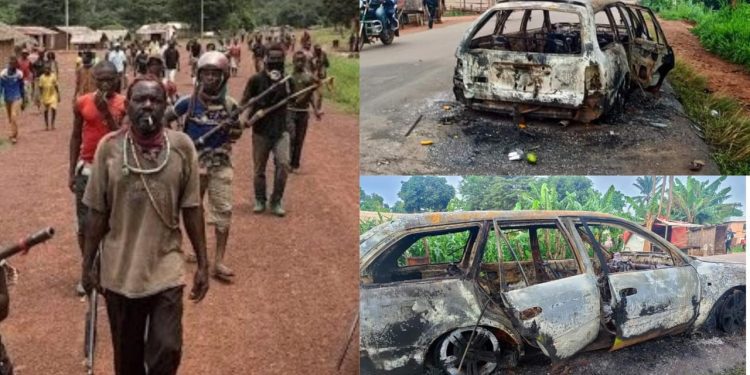Separatist militants recently targeted taxi drivers in Bamenda, unleashing a wave of terror that has devastated livelihoods and heightened fear among residents.
Armed with firearms, the separatists fired bullets at taxis, destroying their tyres and rendering many vehicles inoperable. At least one vehicle was also burned during one of the attacks.
An amateur video posted on separatist propaganda pages captures the attackers declaring their demand: “We don’t want any taxi painted yellow. Every taxi should be painted blue and white, and we are here to enforce that.”
The attackers, brandishing their weapons, identified themselves as Ambazonia fighters and took turns shooting at the taxis.
This brutal enforcement of their colour mandate has left taxi drivers in a precarious state.
Many drivers, already struggling to make ends meet due to years of armed conflict, are now facing additional financial burdens and the threat of further violence.
Andrew (not his real name), a taxi driver in Bamenda, told MMI about the increasing hardships even before the attacks.
“I have been a taxi driver in town for the last 16 years. In the past, I could pay my bills with no stress, but these days, my ends can barely be met,” he said, his voice tinged with despair.
Another driver, who identified himself only as Nche, expressed the futility and danger of repainting their taxis as demanded.
“It’s challenging for us to spray our taxis in blue and white. The separatists can only kill us who are armless and helpless, but they have no power to secure us should we comply with their prescribed colours,” he said.
The sense of betrayal and hopelessness among the drivers is palpable.
“It is embarrassing that people who want to liberate us are now focused on killing us. It’s better we remain slaves to the oppressors (referring to the Yaounde administration) than die painfully in the hands of our own children,” lamented Adamu, another taxi driver.
The impact of this violence extends beyond taxi drivers. Agwe (not his real name), a plantain trader, highlighted the broader implications.
“We go through a lot to transport food from the farms to the market. These boys (referring to separatists) are bent on killing all of us,” she said.
The recent wave of attacks has forced some taxi drivers out of business, exacerbating the economic decline in the city.
One driver, spotted at a travel agency, shared his grim decision. “The only option I have now is to take my family out of Bamenda. I can now see the crisis is ‘Bamenda wickedness on the Bamenda man,” he said.
Drivers are not the only category of people targeted by the separatists. Other private individuals, including a snack bar and shop owners, have been targeted as well over the least suspicion of working on imposed ghost town days.
As a result of the violence, Bamenda has become a ghost town by evening.
The situation has further been worsened by a government curfew on motorbikes, the city’s most vibrant public transportation sector.
Bamenda now shuts down by 5 pm, with residents waking up only by 7 am. Nightlife has all but vanished, turning Bamenda into a shadow of its former self.
This ongoing conflict and the separatists’ ruthless tactics continue to undermine the stability and safety of Bamenda, leaving its residents in a state of fear and uncertainty.
The call for change, once seen as a glimmer of hope, now feels like a death sentence for many caught in the crossfire.



